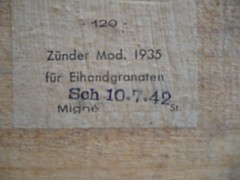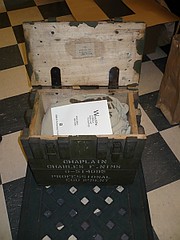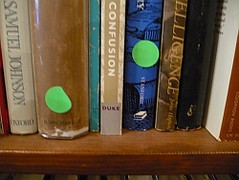Many of you have been to our store before. No doubt you are acquainted with the monk who sits serenely at the rear, and the ill-fated buffalo whose head hangs just above the beginning of American History (no coincidence, that). What, one might ask, do these two members of O'Gara and Wilson have in common with Douglas Wilson, owner of this venerable institution? What spiritual kinship inspired him to recruit such unusual allies in the bookselling battle?
Let me put your curiosity to rest. The Scriptorium monk represents care for the printed page, a connection with times long past, when an author's text required the hand of a craftsman for its completion. In the mid-1800's book-binding machines began to catch on, slowly reducing the concept of "book" to nothing more than an efficient means for distributing ideas. Mr. Wilson and Jerome, as he is fondly called, still cherish the idea of book as artifact, something the significance of which depends not merely on the meaning of the words within, but is continually shaped by all those who share in its history, from the author to the customers that frequent second hand bookshops.
And the buffalo? Both he and Mr. Wilson represent what biologists refer to as a “keystone species.” A keystone species has a disproportionately important effect on its surroundings. Though its presence may be small in terms of population, the existence of a keystone species is crucial for sustaining diversity of life in its environment. When such a species goes extinct, the ecosystem that it supports falls apart, like a bridge whose keystone has been removed. Mr. Wilson and the store he runs are a powerful if subtle force, shaping the Hyde Park community and consequently the world. Luminaries like author Saul Bellow and theologian David Tracy have found fuel for their intellectual furnaces here, at this well-stocked woodpile of ideas, whose logs are daily gathered, bundled, and delivered by the bibliotaph (one who caches or hoards books) of whom we speak. Not to mention the many others who pass through our doors, hoping to stumble upon some synchronicity that radically changes their perspective. One can only imagine what would happen to the diversity of life and thought in Hyde Park if O’Gara and Wilson were to be replaced by, say, another Borders.
And that brings me to the most important part of this blog, namely the crucial difference between Mr. Wilson and these two fixtures of his bookstore. Not only is he still alive, but Mr. Wilson plans on continuing to thrive. He will not bow to the cultural forces that escorted monastic scribes and majestic herds to their respective graves. This keystone species, at least, is fighting and winning. The used bookstore’s struggle to survive can take many forms. Mr. Wilson is unique in that he employs a three-pronged approach. In fact, he himself has suggested the metaphor of a three-legged stool. This term was supposedly coined by Oxford scholar Rev. Richard Hooker, in reference to the Anglican church (sorry, Jerome) and the three legs that support it: scripture, reason, and tradition. Our elements are humbler, but no less important to stability. They are high-end auctions (Collectible), in-store sales (Favorite), and the internet (Affordable and Interesting).
Most people don’t know it, but much of the bookstore’s revenue comes from consigning very collectible books and items to auction houses. These venues have an international audience, ranging from university libraries to enormously wealthy private collectors. Here are some examples:
http://www.swanngalleries.com/index.cgi
http://www.bonhams.com/
While your average walk-in customer may not have the necessary liquidity to purchase Shakespeare’s hand-written first draft of Romeo and Juliet (originally entitled Romeo and Bernice, it appears), auction houses allow Mr. Wilson to distribute such items through the proper channels.
But whence these auction-worthy artifacts? Is Mr. Wilson some sort of latter-day treasure hunter, digging under every Hyde Park oak until he discovers the secret stash of an eccentric Shakespeare scholar? Do kind souls simply drop box upon box of their Loeb classics on our doorstep? Nuh-uh. Aquiring a truly magical used bookstore inventory is a simple function of customer relations and rapport with fate.
Let me explain. Quite often it is long-time bookstore patrons who provide us with our wares. We have seen books come back through that were once sold by Mr. O’Gara over thirty years ago. Without long-term customer relationships our store would be dead in the water, not only because no one would sell us any books, but also because many people wouldn’t have cool books to sell. Just as often, though, sheer chance seems to bless Mr. Wilson with extraordinary caches of books and objects, although when something chancy occurs on a regular basis it’s usually due to something. But how do you explain this –
 .
. 
a German hand-grenade storage box, converted by an army chaplain into a container for bibles and altar cloths. Talk about swords to plowshares – and a serious instance of the book as a historical artifact. Good luck finding another one of those, or any of the other strange confluences of events that can be found and purchased at O'Gara and Wilson…
Unfortunately, the gusts of modernity will overturn any two-legged stool. Science and technology vigorously trumpet the demise of feeble furniture: “Physically impossible!” they cry, or “I can buy a three-legged stool for less online!” until the vast majority of two-legged-stool-used-bookstore-hybrids are chopped into metaphorical kindling, to be sold somewhere else, or failing that, to be unceremoniously dumped in the dustbin of history. We have not remained in the Luddite past of unscientific bookstore cavern-people. Like some nuclear accident that results in a positive mutation, we evolved a third leg. The internet.
http://www.abebooks.com/servlet/ListingBrowse?vendorclientid=78077
That links to our online inventory. You may have thought the appearance of these funny stickers around the store had a deep meaning –

-- discounts, perhaps, or a pox with a tendency to infect more expensive academic texts. Not so. These are the brands of the internet, bright marks of our submission to a new order. Orange dot: book might go online. Green dot: book is online. Some days we sell more books online than we do in the store. Much clerk time goes into putting books online, or searching the internet for prices so we can be the best deal in town (that is generally how we price our books, in line with the lowest online prices). There is a new competitive force; the open market of the internet has changed the face of bookselling. Now a beautiful art book might be worthless because so many were printed, but an expensive Russian calculus book might be salable to a client overseas. There are drawbacks to the internet, but for a store like ours there are also advantages, provided we are ready to use them. Right now, in fact, you are helping us with another aspect of the mutant technological third leg, just by reading this blog. Go on, write in! Let us know you made it this far through the blog! Let us know you’re out there! Come into the store, and say – the blog technology brought me here!
Uh-oh. Things are getting a little out of hand. I think we covered everything we set out to cover – from O’Gara and Wilson, this is cyber-Alan, wishing you a three-legged future with Jerome.

3 comments:
Hi, love the blog, but it did not in fact bring me to your store. I've been a customer for more than twenty years, starting when as a starving student I paid for a gorgeous victorian heraldry book for my future husband in installments. Since then, I've loved your store and your selection, and I'm terribly glad you've adapted to modern tech and sales. May you go on for decades still to come.
Alessandra
Hi Alan!
That's a terrific entry about the survival of used bookstores. People should only know the economics of the business, and perhaps hearing the story you recently shared with Lydia would help customers understand what a rara avis Hyde Park has in O'Gara & Wilson.
At this point I am laboriously compiling a list of my own father's bird books to give to Doug for pricing. Whatever he wants to buy for the store, I will bring with me when I come to spend January as a student at Meadville-Lombard.
Diggitt (Lydia's mom)
Hi,
I am a new customer, though I found the store before the blog. It is a splendid bookshop, and the blog is fantastic. I appreciate the kind of quality and dedication you all put into the business.
Derrick
Post a Comment